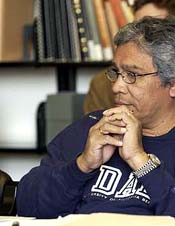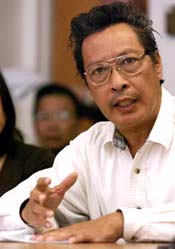|

|

|
NEWS SEARCH
|
|
|
|

|
Berkeley
panel questions Al Qaeda link to Bali bombing
21 October 2002
By Bonnie Azab Powell, Public Affairs
BERKELEY - A panel of UC Berkeley Southeast Asian faculty,
visiting scholars, and journalists convened Friday, October
18, to discuss the recent Bali nightclub bombings. They urged
caution in immediately linking Al Qaeda to the October 12 attacks,
in which more than 180 people died. Recent history, they agreed,
indicates that the bombers are more likely to belong to either
the Indonesian military or domestic insurrectionist groups.
| |
|
 |
| Thamrin
Ely, Berkeley visiting scholar and Islamic peace activist |
"Why was the (Indonesian) defense minister so quick to
blame Al Qaeda?" asked Sylvia Tiwon, an associate professor
in Berkeley's South and Southeast Asian Studies department who
focuses on Indonesia. "So he can say, 'It's not us.' Once
Al Qaeda has been named as a culprit, there are no more questions."
The discussion dealt first with the many fringe theories about
the event. Many Muslim Indonesians, Tiwon said, believe that
the Bali bomb was a U.S. or Israeli plot and not an Islamic
one. The panelists dismissed those theories, and warned that,
given the early stage of the investigation, jumping to any conclusion
about who was responsible was premature — including the
rush to link Al Qaeda.
More likely, they agreed, the bombing was part of the violence
that has been increasing in frequency and intensity in Indonesia
since 1998. There are several domestic groups that could be
responsible, and they did not rule out rogue elements of the
Indonesian military.
"We must look at the groups that could be involved, especially
those dissatisfied with the current government," said Jeffrey
Hadler, South and Southeast Asian Studies assistant professor.
An Indonesia specialist, Hadler previously taught Indonesian
history and historiography to graduate students at the State
Institute for Islamic Studies in Jakarta.
A loosely controlled country of more than 3,000 islands with
the world's fourth-largest population, Indonesia has many ethnic
groups fighting for independence. The country has experienced
serious sectarian violence between Muslims and Christians in
Central Sulawesi, the island of Lombok, and the Maluku islands
(known in the West as the Moluccas). Attacks on the Moluccan
island of Ambon eventually led the Indonesian government to
declare a civil state of emergency in June 2000. The independence
movement of East Timor has also been a bloody one.
There have been a string of bombings in recent years, pointed
out Harry Bhaskara, an Indonesian journalist with the Jakarta
Post and a visiting scholar at Berkeley. But because few foreign
nationals have been killed in the previous attacks, they attracted
little media attention. For example, on September 14, 2000,
a car bomb in the underground parking garage of the Jakarta
Stock Exchange killed at least 15 people and injured more than
30.
Two bombers were apprehended and identified as members of the
Kopassus, the special forces unit of the Indonesian military.
The stock exchange bombing happened around the time that Indonesia's
former dictator Suharto was being investigated, as did the December
25, 2000, attacks on churches across Indonesia, leading many
to conclude that the military was trying to influence politics.
Meanwhile, in August of this year, a shooting at the Freeport
mine in Papua, Indonesia, left three people dead, including
two U.S. school teachers. Some evidence suggests that Kopassus
soldiers staged this attack in the guise of one of the insurrectionist
groups.
"An awful lot of what's been labeled terrorism in Indonesia
has links to the Indonesian army," said Hadler.
| |
|
 |
| Harry
Bhaskara, Berkeley visiting scholar and Jakarta Post journalist |
Bhaskara agreed: "The military likes to use these radical
groups, like Laskar Jihad and Jemaah Islamiah. Sometimes they
groom them; sometimes they beat them."
Indonesia's politics are as fragmented as its geography. Jemaah
Islamiah, the Indonesian group named as the main suspect in this
month's Bali bombing, wants to form a Pan-Islamic state composed
of Malaysia, Indonesia and the southern Philippines. Laskar Jihad,
meanwhile, is an Islamic group that has been linked to attacks
in Ambon. Although the group claims to have disbanded, Berkeley
visiting scholar Thamrin Ely, an Islamic peace activist from Ambon,
believes they have simply gone underground to avoid punishment
for their many human rights abuses. (Ely has experienced their
violence firsthand; his Ambon home has been burned to the ground
twice.) And then there is the Free Aceh Movement, or GAM, which
asserted control over most of Aceh's territory and was then suppressed
by the Indonesian military.
All of these groups have motives to humiliate the Indonesian
government by destabilizing it economically — crippling
tourism and foreign investment — and by making the government
appear weak and ineffective.
"The question is, who will benefit the most from the chaos
caused by the bombing?" asked Hadler. "Al Qaeda stands
to lose a lot." He explained that President Megawati Sukarnoputri
(known to her citizens as Megawati) has been lax about internal
security and about cracking down on money laundering. New post-bombing
international scrutiny likely will result in much greater obstacles
to Al Qaeda's Indonesian operations.
Tiwon and others also questioned the government assertion that
Abu Bakar Bashir, the leader of Jemaah Islamiah, is an Al Qaeda
operative. The evidence against him comes mainly from Omar al-Faruq,
a Kuwaiti now in U.S. custody who is reportedly Al Qaeda's point
man in Southeast Asia and who told U.S. officials that he and
Bashir had been planning to bomb American embassies in the region.
Bashir just checked into a hospital to avoid being questioned
about having played a role in the Christmas bombings.
"In Indonesia, Al Qaeda has turned into this incredibly
convenient organization to blame, like communism during the
Suharto period," said Hadler. "It exists, of course,
but what does it mean to say 'I'm affiliated with Al Qaeda'?
Does it mean you're receiving funds, or that you're just ideologically
aligned?"
Panelists also discussed what long-term effects the Bali bombing
and the alleged link to Al Qaeda might have on Indonesia. Many
news reports have focused on the peacefulness of Bali's overwhelmingly
Hindu population, but Hadler noted that the Balinese do have
a historical capacity for violence, as evidenced by the bloody
communist hunts of 1965 and 1966. If the Balinese were to rise
up and expel the increasing numbers of Muslim immigrants, the
backlash could strengthen Muslim movements around Indonesia
— perhaps one of the bombers' goals. (Of Indonesia's 230
million people, some 170 million are Muslim.)
But the more immediate and chilling effect of the bombing,
the group agreed, was to stall Indonesia's slow transformation
from a quasi-military dictatorship to a democracy.
"This is all happening just as Indonesia was reaching
a phase of real democratization and implementing a rule of law,
for which people have fought very hard," said Tiwon. Megawati
signed an emergency decree last week that allows terrorist suspects
to be detained for up to six months without charge. "The
goal was to no longer have these closed tribunals taking place."
Agreed Hadler, "Megawati is not a positive democratic
force. She's been very imperial already, and with U.S. support,
she'll get even more military power and carte blanche to curtail
democratic rights."
|

|